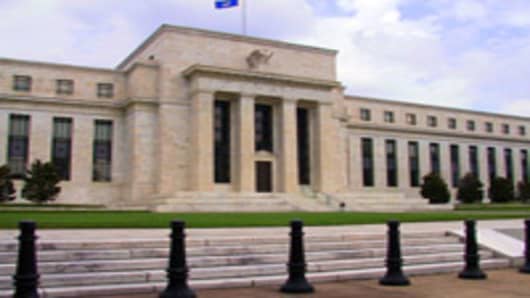After lackluster job creation in August, economists and the markets are readying for another round of Fed asset purchases, or quantitative easing. The only question now is do policy makers act in September or wait until the fiscal drag pulls down the U.S. growth rate?
The U.S. economy managed to create only 96,000 jobs in August, below economists’ forecasts for 125,000 and the addition of 141,000 jobs in July. The unemployment ratedid fall to 8.1 percent, but largely as dispirited job seekers gave up their search. (Read More: New Jobs at 96,000, Missing Expectations; Rate Hits 8.1%.)
"I'm completely shocked by today's report,” Todd Schoenberger, managing principal at The BlackBay Group, said. “Recent economic data would support a jump in construction, manufacturing and education, but the net-net is absolutely miserable.”
“The only positive is it does provide a bit of octane for the Fed to possibly move into another monetary policy move at next week's meeting," he added.
In the minutes of its last policy meeting, the Fed indicated that “many” members said additional policy accommodation is potentially warranted unless the economy improves substantially. It also suggested that the move could come “fairly soon.”
With today’s jobs report, many economists now take “fairly soon” to mean next week — the Federal Reservemeets on September 12 and 13.
The odds of QE3 at next week’s meeting are now above 50 percent, according to Goldman Sachs economist Jan Hatzius. But he conceded it won’t help improve the employment situation or do much to snap the economy out of its sluggish 2-percent trend growth. (Read More:Probability of Fed Easing Above 50%: Hatzius.)
Diane Swonk, chief economist at Mesirow Financial, told CNBCshe was 50/50 on the Fed doing QE3 last week, but said immediately following the jobs report “This is it.”
But some economists think the Fed should wait because the economy could actually get worse going into the end of the year. While chief economist at Moody’s Analytics Mark Zandi anticipates more Fed action, he thinks the Fed holds off for now.
“I think we wait until after the election because they are looking at the election and each time they do QE it gets less potent," he said. "They'll need it after this year.”
After the election, Congress is likely to finally start to tackle the "fiscal cliff," when a host of tax cuts expire and spending increases kick in. But the ongoing uncertainty surrounding U.S. fiscal policy could cause additional pressure on the economy.
Notoriously bearish economist Nouriel Roubini predicts growth of close to 2 percent for the third quarter, but expects a slowdown in the final quarter of 2012. “If you get the fiscal drag as growth slows, you’re close to zero growth next year,” he said. “This implies that by December the Fed is going to do a third round of QE.” (Read More: Roubini: If Jobs Number Is Weak, QE3 on Its Way.)
But the politicians still need to do something about the country's fiscal problems. On CNBC on Friday, Republican vice presidential nominee Paul Ryan said that monetary cannot bailout poor fiscal policy.
"Our monetary policy has been trying to serve as a substitute for really bad fiscal policy," he said. (Read More:'This Is Not What Recovery Looks Like': Ryan.)
Michelle Meyer, BofA Merrill Lynch’s senior U.S. economist, said in a CNBC interview thatthe economy needs both supportive monetary and fiscal policy.
“One of the big downside risks to the economy comes from poor fiscal policy,” she said. “At the end of the year we see a dramatic cut to fiscal spending, which would be very damaging for the economy.”




